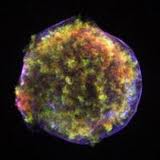Teaching Philosophy
In the past few decades, much research has been done on what methods work best in teaching science at the college level -- Peer Instruction, ConcepTests, "clickers," "studio physics," alternative evaluation techniques, and so forth. But what research has shown most conclusively is that the best teachers care about and engage with students. In that sense, the most important things I can say are also the most basic: I care about students, I care about ideas, and I care about -- and enjoy -- teaching. Finding ways to make physics interesting and accessible to non-science majors; in-depth instruction done with advanced students; facilitation of individual growth through mentoring students in research; and the less formal teaching involved in outreach -- each is challenging, exciting and fulfilling to me in a different way. But in all of them, my goal is to create an environment where each learner can best investigate the world and expand his or her own understanding.
In all courses I have three main goals. The first is to give my students an understanding of the subject matter, including knowledge of basics, while emphasizing the framework of the discipline as a whole, within which individual information can be placed. Without the framework, individual information is easily lost, whereas once the framework is in place, new information can be incorporated as it is encountered -- even after the course is over. Second, I want my students to have an understanding of how we know what we know about the way the universe works, and to develop a critical faculty that allows them to evaluate new ideas and evidence. This critical analysis will be useful to students in all areas of their life where they must evaluate and choose between viewpoints. Finally, I would like my students to have a positive learning experience, because positive reinforcement is likely to encourage them to continue learning in the future... and because I would like them to be happy.
Some of the most enjoyable teaching I have done has been in laboratory courses, at the University of Wisconsin-Madison, East Tennessee State University and now Weber State University. In these courses, I have worked with students of many backgrounds, from math-phobic senior art majors to freshmen and sophomore physics majors. By their nature, laboratory courses are set up to allow interaction with students as they attempt to complete a task. The combination of a need to accomplish something concrete with the chance to interact one-on-one encourages them to ask questions in ways we usually only dream about in lecture courses. I use that interaction to find out where they are in the process of wrestling with the material, and determine what they need to take the next step in their understanding. My goal is not to give them the answer, but to give them the information they need to reach the answer themselves. There are few things as profound as watching understanding dawn, and seeing a student enjoy learning.
This past year was the first time I have taught full time. It was an extraordinary experience for me, full of many surprises, frustrations, joys -- and a lot of work. Weber State University has a dual mission, serving the community as an open enrollment institution and as a state university. As a result, I have had the chance to work with a range of extraordinary students, from a high school student taking college physics on his way to medical school, to an Iraq veteran who was dealing with severe PTSD issues and struggling through math she used to be able to do easily, to two retired technical workers auditing courses for fun. It has been a challenge to translate and adapt my teaching philosophy into practices that work with these students in classes from 20 to almost 100 students, but that challenge has also grounded and reaffirmed my commitment to these ideas.
It is in the larger classes where I believe many of the recent ideas to come from education research can make a difference. ConcepTests and Ranking Exercises provide students with a task to accomplish. Allowing students to work together to find the best answer (Peer Instruction) encourages students to hone their ideas and understanding with each other, and allows me the opportunity to have one-on-one interactions, even in a large classroom. And having students respond to the questions either through analog means (holding up cards, since "clickers" are not practical here) stimulates participation and creates accountability.
I believe we "get what we measure," so my assignments are designed carefully to test for the skills and understanding I want my students to acquire, and implicitly to give feedback on my performance. An oral exam may not be practical for large lectures, but in medium to small classes, it can give a very different window into how the student has experienced and understood the course material. It also gives a chance to employ the interactive learning process I have found so valuable to students in laboratory courses. In written exams and homework, I include questions that use synthesis and analytical strategies to encourage the same kinds of thinking as in-depth interviews.
All of this requires work, time and especially practice to do right, but I believe it is important to tailor a course for my individual students. I am particularly proud of the exceptional comments I have received in my course reviews, some of which I have included at the end of this statement. Of course, as I try things to improve my teaching for each student, things don't always turn out as I expected. Teaching is a never-ending learning process, and one that I see as a rewarding challenge to me as an academic and a lifelong learner in all areas of my life.
